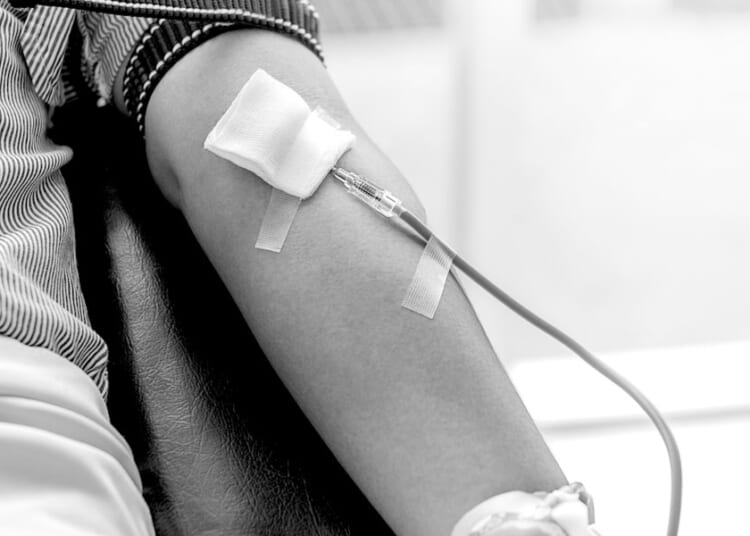JUST when TCW readers might have thought they had heard enough about the covid jab harms, a major review has called for the vaccination campaign to be suspended pending studies of the risks to blood transfusion and organ transplant recipients.
A team of researchers in Japan say that, based on the volume of evidence that has come to light about post-vaccination harms, medical professionals worldwide should be alerted to potential dangers in using blood derived from people who have had the jab, as well as from those suffering persistent symptoms from covid itself (‘long covid’). They say methods to identify and remove the contaminants are urgently needed, and propose a range of specific tests and regulations to deal with the risks.
The lead author of the 20-page report, posted on March 15, is Jun Ueda, associate professor in the department of advanced medical science, Asahikawa Medical University. The highly referenced paper is a preprint, not yet peer-reviewed.
In it, the researchers say that intensive studies of the covid virus itself have shown its key mechanism of harm to be the way its spike protein binds to blood vessel walls, triggering blood clots.
‘However, it has been reported from various countries around the world that genetic vaccines such as mRNA vaccines encoding spike proteins have also caused a wide variety of diseases in all organs and systems, including the nervous system, in addition to thrombosis and resulting cardiovascular disorders.’ This is because the gene products go beyond the site of the jab to organs and tissues throughout the body.
Contrary to initial expectations, the genes and proteins are now known to persist in the blood for prolonged periods, and post-vaccination syndrome, or ‘spikeopathy’, has become a major global problem, the researchers say. The jabs should have been regarded as biomedicine, but because they were classified as vaccines, huge numbers of people were inoculated and many areas of medicine are beginning to become involved with the consequences. ‘This has never happened before in the history of biomedicine, and consequently it is highly suspected that blood products for transfusion have been affected.’
A search of the medical literature on diseases related to blood and blood vessels, combined with the key words ‘Covid-19 vaccine’ and ‘side effects’, yielded several hundred articles. In addition to abnormally shaped red blood cells, microscopic examination has shown grossly abnormal materials floating in the blood of some mRNA-vaccinated individuals.
The spike protein can cause amyloidosis (a rare disease in which a protein called amyloid builds up in organs such as the heart, kidneys, liver, spleen, nervous system and digestive tract). It can also cause prolonged immune dysfunction, increasing infection risk, and can cross the blood-brain barrier, with the potential to affect brain function.
‘Thus, there is no longer any doubt that the spike protein used as an antigen in genetic vaccines is itself toxic . . . From the perspective of traditional containment of infectious diseases, greater caution is required in the collection of blood from genetic vaccine recipients and the subsequent handling of blood products, as well as during solid organ transplantation and even surgical procedures.’
The review says that because blood contamination affects so many areas of health care, blood donors should be interviewed so that records can be kept of when and how many genetic jabs they have received. Since it is not known how long the jab products persist in the body, their blood should be used with extreme caution.
The paper sets out a range of tests needed to confirm the safety of blood products from gene vaccine recipients, and to check for contamination with spike protein or the modified genes used in the jabs. It says guidelines are needed on how to handle blood found to contain the contaminants.
‘If the blood product is found to contain the spike protein or a modified gene derived from the genetic vaccine, it is essential to remove them,’ the researchers say. But since there is currently no reliable way to do so, ‘we suggest that all such blood products be discarded until a definitive solution is found’.
Medical facilities unable to take such a step immediately should explain the possibility of contamination with spike protein or other foreign substances to prospective patients, and include this warning on the consent form.
The most important initial action is to make the relevant medical personnel aware of the situation, the review states. ‘Unless accurate tests are established, no conclusions can be drawn about the risk or safety of blood transfusions using blood products from gene vaccine recipients.
‘Thorough and continuous investigation is therefore necessary. To accomplish this, all potential donors should be registered, traceability of blood products should be ensured, and rigorous recipient outcome studies and meta-analyses should be maintained.’











